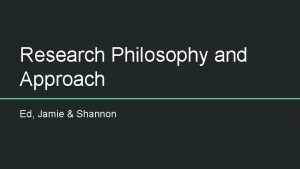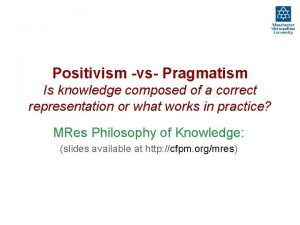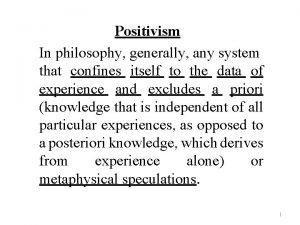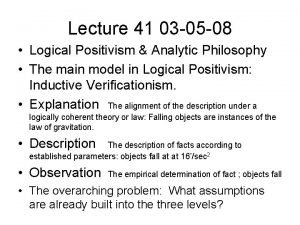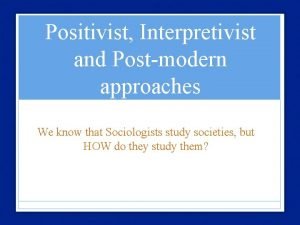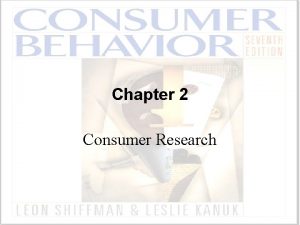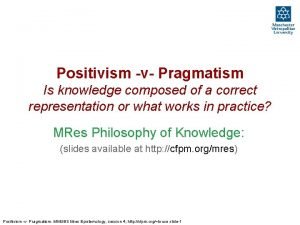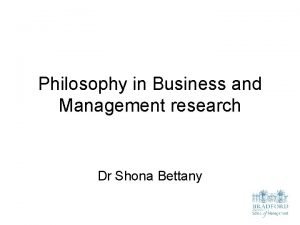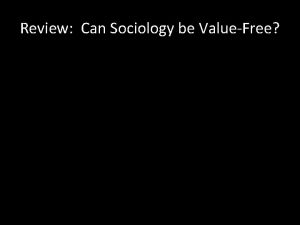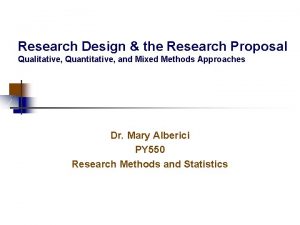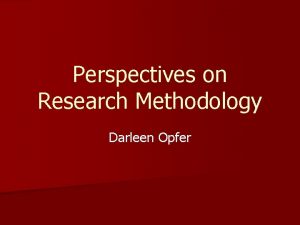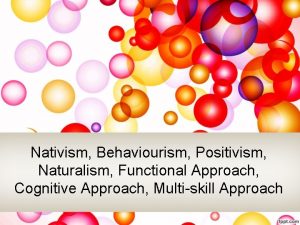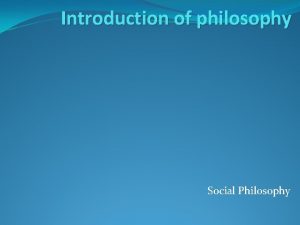Research Philosophy and Approach Ed Jamie Shannon Positivism















![References Positivism: 1. Advantages & Disadvantages of Positivism | Synonym [Internet]. Classroom. synonym. com. References Positivism: 1. Advantages & Disadvantages of Positivism | Synonym [Internet]. Classroom. synonym. com.](https://slidetodoc.com/presentation_image_h2/43e09448689fd5312a9135087548ddd5/image-16.jpg)
![References Deductive: 1. inductive or deductive approaches [Internet]. Warwick. ac. uk. 2020 [cited 6 References Deductive: 1. inductive or deductive approaches [Internet]. Warwick. ac. uk. 2020 [cited 6](https://slidetodoc.com/presentation_image_h2/43e09448689fd5312a9135087548ddd5/image-17.jpg)
- Slides: 17

Research Philosophy and Approach Ed, Jamie & Shannon

Positivism The positivism philosophy is based of the idea that science is the only way to learn about the truth, through obtaining factual knowledge retrieved through observations. Advantages ● ● Quantitative approach, scientific assumptions can be created Well defined structure, with set laws and rules to be followed Patterns and trends can be illustrated through the data gathered. Minimal chance of misinterpreting responses through the use of quantitative data. Disadvantages ● ● ● Human behavior is disregarded, with no guarantee that it hasn’t interfered with studies. Not flexible due to everything being measured or calculated. They disregard unexplained phenomena. Weak at understanding social processes

Positivism Example of when to us it: ● ● Scientist gather research on how to make computer processes quicker, gaining factual knowledge to upgrade computer systems. Researchers can use a positivist approach to gather business related information, such as current a network performance. Example of when not to use it: ● Is unsuitable when the research requires gathering viewpoints and opinions of participants.

Positivism Collection Methods Questionnaires (Recommended) ● ● Quantitative data can be gathered and processed quickly. Easily scalable Quick and easy to analyse and visualize Offers anonymity (Impacts responses) Structured Interviews (Recommended) ● ● ● Answers don’t deviate from questions Quality of responses Lesser interviewer bias

Positivism Collection Methods Focus Groups (Not Recommended) ● ● ● Low number of participants Data analysis is difficult Provides too much qualitative data Observations (Not Recommended) ● ● ● Misinterpretation of observations People may act differently under observation Attitudes cannot be studied

Phenomenology is a research philosophy that favors qualitative research. It studies an individual’s lived experiences. It is linked to an inductive research approach. Pros: ● ● ● Better understanding of social processes Suited for small scale research Reaches a wider audience Cons: ● ● ● Data gathering takes more time and resources Data can be misinterpreted There is a greater risk of bias

Phenomenology Collection Methods Semi-Structured Interviews (Recommended): ● ● ● Non-verbal communication can be recorded Tone and expression can be recorded Opportunity for clarification Allows for follow up questions Minimises misinterpretation Focus Groups (Recommended): ● ● Same advantages as above Allows participants to discuss with each other

Phenomenology Collection Methods Surveys (Not Recommended): ● ● Closed questions provide quantitative answers Open questions can be misinterpreted Participants may rush the survey Responses cannot be followed up Structured Interview (Not Recommended): ● ● Too rigid Cannot clarify questions Cannot ask follow up questions Cannot press participants for more details

Phenomenology Uses Phenomenology is best used in IT when trying to understand the viewpoints of the people who use it. Such as: ● Understanding ICT scarcity ● Finding the root cause of IT related issues ● Understanding the user’s experience with technology Phenomenology is unsuitable when the research requires a more factual and evidence based approach.

Positivism/Phenomenology Comparison Positivism Phenomenology Quantitative/Qualitative Quantitative Qualitative Focus of Study Facts, Figures, Logic Individual’s Feelings, Thoughts, Opinions Preferred Approach Deductive Inductive Preferred Uses To understand phenomena using scientifically verifiable means such as mathematics To understand phenomena based on how it is viewed by others Unsuitable Uses To understand phenomena based on how it is viewed by others To understand phenomena using scientifically verifiable means such as mathematics

Deductive The Deductive approach is a testing theory. It is linked to positivism and tends to use quantitative data. Benefits: ● ● ● Larger amount of data can be analysed quickly. More credible in terms of interpreting the data. Makes for easy collaboration on projects, and authenticity of data can be examined. Drawbacks: ● ● Limits the scope of research as it is carried out on pre-determined information. Usually more expensive to carry out due to the data collection and analysis. ● Quality of data is dependent on the collection method.

Deductive Usage Existing Theory: There always delays in low cost airlines Hypothesis: If passengers are going to travel with a low cost airline, they will experience a delay. Data: Flight data will be collected from the airlines Analysis: 10% of flights are not delayed, therefore the hypothesis is rejected. Best uses - Science, medicine, psychology Less suitable - art, anthropology, sociology, history

Inductive The inductive approach is a building theory. It is linked to phenomenology and tends to use qualitative data. Benefits: ● ● ● Opens up possibilities of further exploration. Flexible method - no predetermined information to follow. In-depth rich collections of data. Drawbacks: ● ● ● Miisinterpretion by other people possible. Can be difficult to analyse large quantities of data. Observations may be incorrect leading to incorrect conclusions.

Inductive Usage Observation: flight is delayed for a low cost airline Pattern: through observation, another 20 flights have been found to be delayed. Theory: All low cost airlines must be delayed Best uses - art, anthropology, sociology, history Less suitable - Science, medicine, psychology

Deductive/Inductive Comparison Inductive Deductive Qualitative/Quantitative Qualitative Quantitative Perspective Subjective Objective Focus Verstehen Erklaren Method Participant Observation Survey Techniques Uses Art Science Philosophical Theory Phenomenology Positivism
![References Positivism 1 Advantages Disadvantages of Positivism Synonym Internet Classroom synonym com References Positivism: 1. Advantages & Disadvantages of Positivism | Synonym [Internet]. Classroom. synonym. com.](https://slidetodoc.com/presentation_image_h2/43e09448689fd5312a9135087548ddd5/image-16.jpg)
References Positivism: 1. Advantages & Disadvantages of Positivism | Synonym [Internet]. Classroom. synonym. com. 2020 [cited 11 October 2020]. Available from: https: //classroom. synonym. com/advantages-disadvantages-positivism-12088541. html 2. 11 The Pros and Cons Positivism Interpretivism Advantages Economical collection | Course Hero [Internet]. Coursehero. com. 2020 [cited 11 October 2020]. Available from: https: //www. coursehero. com/file/p 2 njp 9 i/11 -The-Pros-and-Cons-Positivism-Interpretivism-Advantages-Economicalcollection/ Phenomenology: 3. Neubauer, B et al. Link. Springer. com 2019 (Accessed: 06/10/2020) Available From: https: //link. springer. com/article/10. 1007/s 40037 -019 -0509 -2 4. Leach, T. Learning. Middlesborough. co. uk 2014 (Accessed: 06/10/2020) Available From: http: //www. learningmiddlesbrough. co. uk/wpcontent/uploads/2018/02/Phenomenology. pdf 5. Dudovskiy, J. Research-Methodology. net (Accessed: 06/10/2020) Available From: https: //research-methodology. net/researchphilosophy/phenomenology/ 6. Mwadulo, M & Odoyo, C. HRPub. org 2020 (Accessed: 06/10/2020 Available From: )http: //www. hrpub. org/download/20200530/CSIT 113715127. pdf
![References Deductive 1 inductive or deductive approaches Internet Warwick ac uk 2020 cited 6 References Deductive: 1. inductive or deductive approaches [Internet]. Warwick. ac. uk. 2020 [cited 6](https://slidetodoc.com/presentation_image_h2/43e09448689fd5312a9135087548ddd5/image-17.jpg)
References Deductive: 1. inductive or deductive approaches [Internet]. Warwick. ac. uk. 2020 [cited 6 October 2020]. Available from: https: //warwick. ac. uk/fac/soc/ces/research/current/socialtheory/maps/when 2. Niglas K. Quantitative and qualitative inquiry in educational research: is there a paradigmatic difference between them? [Internet]. Leeds. ac. uk. 1999 [cited 6 October 2020]. Available from: http: //www. leeds. ac. uk/educol/documents/00001487. htm 3. Soiferman L. Inductive and Deductive Research Approaches [Internet]. Files. eric. ed. gov. 2010 [cited 6 October 2020]. Available from: https: //files. eric. ed. gov/fulltext/ED 542066. pdf 4. Denscombe, M. , 2014. The Good Research Guide. 4 th ed. Milton Keynes: Open University Press, pp. 269 -270, 304 -306. Inductive: 1. inductive or deductive approaches [Internet]. Warwick. ac. uk. 2020 [cited 6 October 2020]. Available from: https: //warwick. ac. uk/fac/soc/ces/research/current/socialtheory/maps/when 2. Niglas K. Quantitative and qualitative inquiry in educational research: is there a paradigmatic difference between them? [Internet]. Leeds. ac. uk. 1999 [cited 6 October 2020]. Available from: http: //www. leeds. ac. uk/educol/documents/00001487. htm 3. Soiferman L. Inductive and Deductive Research Approaches [Internet]. Files. eric. ed. gov. 2010 [cited 6 October 2020]. Available from: https: //files. eric. ed. gov/fulltext/ED 542066. pdf 4. Denscombe, M. , 2014. The Good Research Guide. 4 th ed. Milton Keynes: Open University Press, pp. 269 -270, 304 -306.
 Inductive vs deductive
Inductive vs deductive What is positivism in philosophy
What is positivism in philosophy What is positivism
What is positivism Bahaviourism
Bahaviourism What is logical positivism in philosophy
What is logical positivism in philosophy The difference between positivism and interpretivism
The difference between positivism and interpretivism Natural law vs positivism
Natural law vs positivism Consumer research paradigms
Consumer research paradigms Positvism
Positvism What is research philosophy and why is it important
What is research philosophy and why is it important Jamie and elizabeth
Jamie and elizabeth Is sociology a science
Is sociology a science What is positivism
What is positivism Adam rhodri
Adam rhodri Appendices in research example
Appendices in research example What is a post positivist approach
What is a post positivist approach Positivism methodology
Positivism methodology Verifierbarhetsprincipen
Verifierbarhetsprincipen
